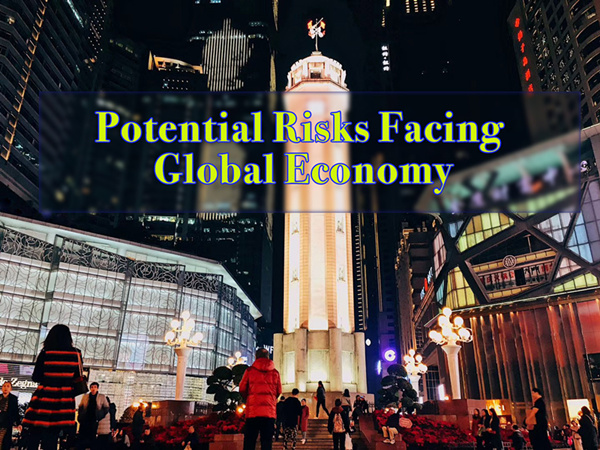Potential Risks Facing Global Economy
2019-01-02

By Dai Hui, Development Research Center
2018-11-1
In 2017 when developed economies and developing economies generally started to recover in lockstep, China’s economy also had a rebound. However, since the beginning of 2018, the US, EU and South Korea have seen a weaker growth momentum, which poses hidden risks to global economic recovery. Unquantified as they are, these factors have a fairly important role in the prediction of global economy as well as its influence on China’s short-to-long-term growth. Therefore, a specific analysis on these major potential risks facing global economy is made as follows. First, the risk of asset bubble burst for major economies. Since the global financial crisis in 2008, the central banks in many countries have adopted the ultra-loose monetary policy, which has caused a measurable amount of bubbles in some markets. Take the US stock market for example. The current Federal Reserve tends to adopt a further tightened monetary policy, under which the US stock asset bubbles might burst. Another concern now is the partial bubbles in China’s housing market. Besides, in the debt markets of the US and Japan there are also some bubbles. Second, the shock from tightened monetary policy of major economies. Major developed economies have successively started interest increases and exited the ultra-loose monetary policy, which will bring a shock to the emerging economies, the economies in slump and the economies with high external debts, thus affecting the pickup of global growth rate. Their interest increases will also accelerate the international capital flow, influence the financial market of different countries, intensify the exchange rate volatility, affect global trade and even undermine the monetary supply and macro-economic stability of other countries. Third, the threat of high debt for some economies. According to the statistics of international clearing banks, in the wake of the crisis, most countries adopt fiscal incentives only to increase the government debt and enhance the governmental liability ratio. Those countries with much external debt may first encounter the dumping of foreign currency bonds in the backdrop of tightened global fluidity, which will drive up the bond interests and financing costs while lower its local currency, making international investors continue with the spiriting away of capital and worsening the economic environment. Fourth, the potential negative impact from the international trade and investment protectionism. In the recent two years, the international trade and investment protectionism is rising. While the US trade policy changes, other countries are also in the process of response and games, which added to the trade frictions. As for the EU, the European Commission advised the EU in 2017 to establish a coordinating group on the foreign direct investment screening framework and foreign investment policy, so as to strengthen the EU’s security review to foreign investment. The reinforced foreign investment review on the part of the US and EU on one hand reflects their severer concern about their technology, data and the security of economic order, and on the other hand will definitely have certain effects on the international investment and stimulate the international investment protectionism, thus hindering the mid-to-long-term development of world economy. Fifth, the impact from the geopolitical shifts and regional wars. Britain started the Brexit negotiations in 2018 and gained a 21-month Brexit transition period. But the second phase of the 2018 negotiations did not run smoothly. Besides, in recent years, due to debt crisis, refugee crisis and the problems with the EU system governance, there have been increased differences among the EU member countries. In addition, it remains a major problem to the short-to-mid-term regional politics and economy whether the nuclear issues in the Korean Peninsula and Iran will be properly resolved. Sixth, China’s needs to make good preparations in its macro-policy. Since 2018, both the constant plummeting of the US stocks and the recent Argentine currency devaluation as well as the dual decrease in Italy’s bond interest rate and stock and bond prices, are all sending signals that we should be keenly aware of the potential risks in the world economy and make full preparations for the possible outbreak of these crises. From the macro angle, China needs to keep its monetary policy prudent. And for the fiscal policy, it needs to reserve enough fiscal room for the international financial fluctuations (and even crisis), and improve the governmental bond management. China also needs to deal well with the international economic and trade relations, especially the trade conflicts with the US, and at the same time strengthen its cooperation with the EU, Japan and South Korea.














